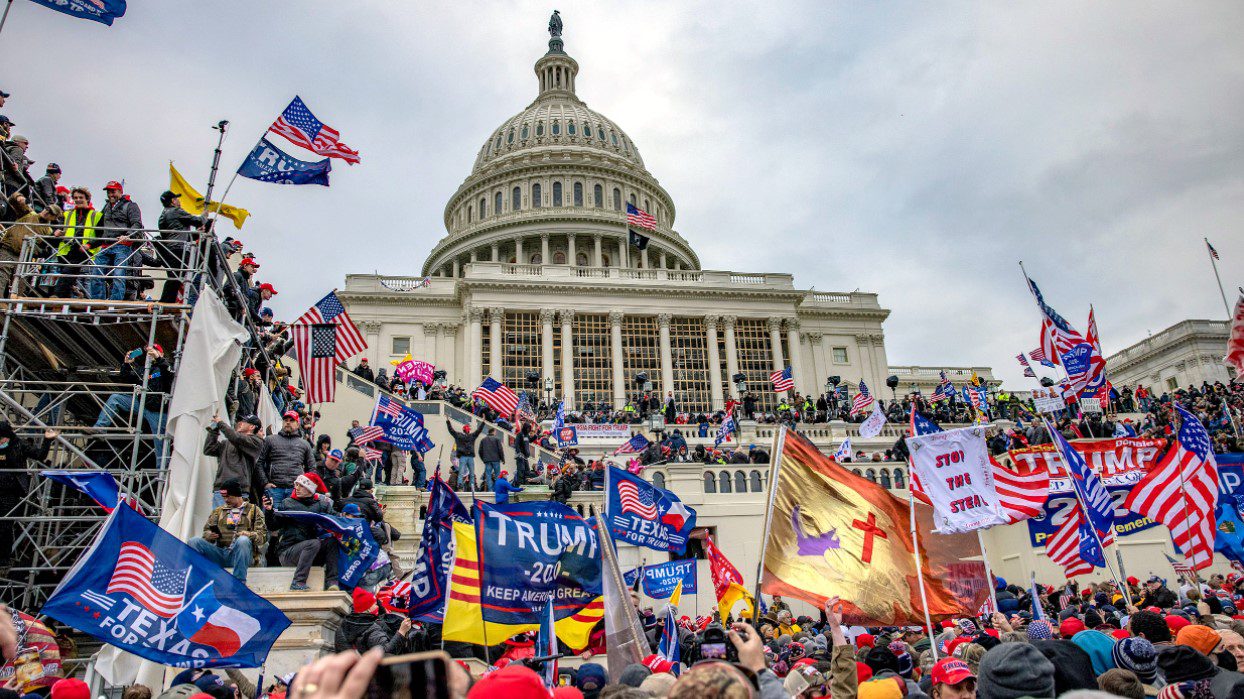
On the fourth anniversary of the January 6 Capitol attack, former President Donald Trump reaffirmed his polarizing promise to pardon individuals convicted for their involvement in the events of that day.
Speaking to a supportive audience and the media, Trump described these individuals as “political prisoners” who had been unfairly targeted. He announced that granting clemency would be one of his first acts upon returning to the presidency, should he win the 2024 election. The anniversary, marked nationwide by somber commemorations and public reflections on the fragility of democracy, was overshadowed by Trump’s remarks, which reignited heated debates over justice and political accountability.
Trump’s statements came during a rally where he reinforced his broader narrative that the events of January 6 were misunderstood and misrepresented by his political adversaries. “We are going to restore justice in this country,” he declared, asserting that those who faced prosecution had been victims of a politically motivated judicial system. His promise of immediate pardons elicited enthusiastic applause from his supporters but prompted sharp criticism from across the political spectrum.
Commitment to Pardons
Trump’s reaffirmation aligns with pledges made throughout his 2024 campaign, during which he positioned himself as an advocate for those convicted in connection with the Capitol riots. He characterized these individuals as patriots who were unjustly treated by what he referred to as a “weaponized” Department of Justice. He further elaborated that his pardons would extend not only to those currently serving sentences but also to individuals who had already completed their sentences. In his view, these actions would constitute a sweeping measure of justice reform, rectifying what he claims to be systemic overreach.
The former president’s framing of January 6 as a protest that “spiraled out of control” reflects his consistent rhetoric of minimizing the day’s violence while deflecting blame onto law enforcement agencies for “failing to adequately secure the Capitol.” His remarks highlight a broader strategy of appealing to his political base by casting doubt on the credibility and intentions of U.S. institutions, which he often portrays as adversarial.
The Scale of Prosecutions
Since the Capitol attack, federal authorities have pursued an extensive investigation, resulting in charges against more than 1,500 individuals. Of these, over 1,000 have been convicted or have entered guilty pleas. Among the convicted are members of extremist organizations such as the Proud Boys and the Oath Keepers, whose leaders received some of the most severe sentences for their roles in organizing and inciting the violence. These convictions have been heralded by many as a necessary step in holding participants accountable and deterring future threats to democratic institutions.
Divided Reactions
Trump’s comments have further deepened the divisions over how January 6 should be interpreted and addressed. His supporters argue that many of the convicted were nonviolent individuals caught up in chaotic circumstances, and they view the prosecutions as politically driven. Critics, however, warn that issuing pardons would undermine the rule of law and could embolden similar attacks in the future. “This sends a dangerous message that violent attempts to subvert democracy will face no real consequences,” said a former federal prosecutor.
Lawmakers, including members of both parties, have expressed alarm over the potential implications of such pardons. The bipartisan January 6 Committee’s final report underscored the importance of accountability, describing it as essential to deterring future acts of political violence and preserving public trust in democratic governance.
Potential Precedent
Legal scholars have noted that Trump’s proposed actions could establish a troubling precedent, signaling that political loyalty may override the enforcement of laws meant to safeguard democracy. “The idea that a president would use pardons to absolve acts of insurrection fundamentally challenges the balance of power and the independence of the judiciary,” one constitutional expert observed. Such concerns highlight the broader stakes surrounding Trump’s rhetoric and its potential impact on democratic norms.
Impact on Democracy
The Capitol attack remains one of the most divisive episodes in recent U.S. history. For many, it represents an unprecedented assault on the nation’s democratic institutions. For others, it has become a symbol of government overreach and political persecution. Trump’s promise to pardon those convicted in connection with the attack underscores these conflicting interpretations, ensuring that the events of January 6 will continue to be a focal point in the nation’s political discourse.
Looking Ahead
As Trump positions himself for a possible return to the White House, his pledge to pardon January 6 convicts raises significant questions about the direction of his prospective administration. Political analysts predict that these actions, if carried out, would provoke widespread backlash and further polarize an already divided nation. At the same time, his unwavering stance has solidified his appeal among his most ardent supporters, ensuring that the issue remains a defining element of his political platform.
The fourth anniversary of January 6 serves as a stark reminder of the fragility and resilience of democratic institutions. Trump’s pledge to pardon those convicted in connection with the attack reflects his enduring influence on American politics and the deep divisions that continue to shape national discourse. Whether viewed as an act of justice or a dangerous precedent, the prospect of these pardons will have far-reaching implications for the rule of law and the future of U.S. democracy.
